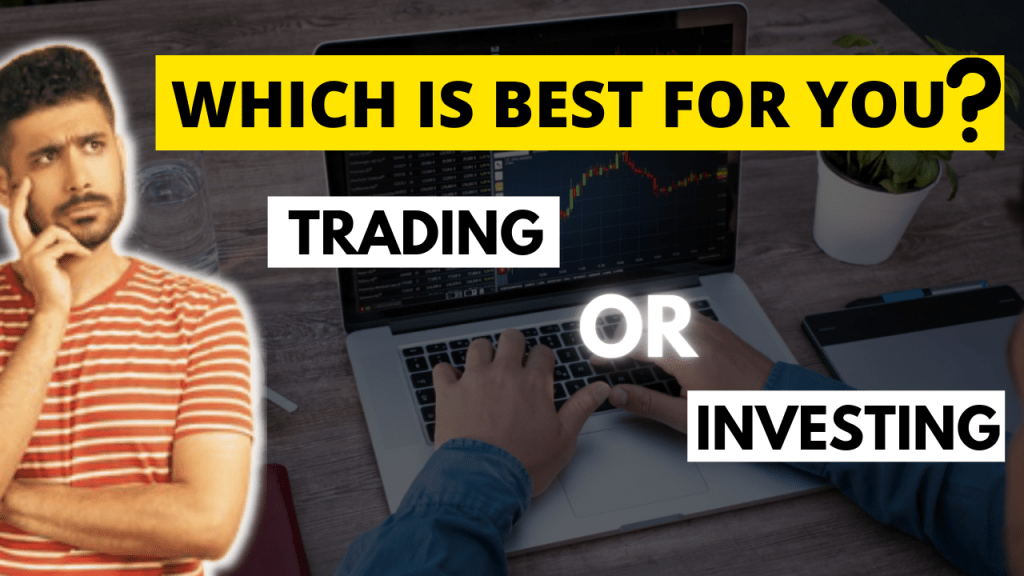
Difference between Trading vs investing
In the financial markets, there are two types of people. One set of people is called traders and another set of people is called investors. In a top view, both may look the same but in-depth both are different and unique.
So to determine what is best we have to research and analyze some important factors. We can spot traders and investors based on their behaviours. So we handpicked five perspectives to analyze the differences between both sets of people.
The differences between Trading and Investing can be categorized into these five topics,
- Technical Analysis
- Mindset
- Income
- Risk
- Time
Technical analysis
Usually, knowledge and education are important in surviving in financial markets. In technical analysis, Traders are the most skilled people compared to investors.
Because traders can understand what’s going on with the market by watching the charts. They can understand the market movement by analyzing the past and find what’s will the market movement in near future.
On the other side, investors don’t know much knowledge in those fields. Mostly by watching the chart they can understand that the price is moving up or down.
Investors are not good at commenting about the near future movements based on technical analysis.
Mindset
In this case, both have very different opinions. Traders’ mindset will be like they do analysis and buy a share which will be going to price up in near future and hold the share until reaching their expected level and sell the share when the price reach that level.
They do this again and again. Traders only focus on making a profit on a specific buy-sell-trade. Most Traders don’t care about the growth of the company or personal bond with the company.
But investors are not like that. Their mindset is that they have to research a company and learn about the company’s supporting factors and performance.
Then they decide to buy shares of the company. Once they buy the share. They will expect the company to grow further and develop its progress and improve its performance.
And they hold the share for many years or more over decades. They will mostly have a special bond and concern with the company.
Income
The income potential is the important thing where this split comes on. If we look at the traders they will have the potential to generate a good return over a small period of time with less capital.
In simple words, traders have the potential to make a 10-15% return over a month and take the profit with them.
But in investors’ the whole plot is different. Investors invest in a company’s share with some big capital. And they expect the potential to make the capital grow for a long period of time.
In simple words, investors can make a 10-15% return in a year. By having a bond with the company and investors get dividends from the company as an additional income from the company.
The fact is they reinvest the return and dividends in the plan of compounding the capital over a long period of time.
Risk
As we learnt about the income we have to know about the risk factors. In trading, the risk potential is compared higher than in investing. Because a wrong movement or unexpected world incident, or mistake in analysis can lead to loss.
And if this repeats again and again if the traders don’t have discipline and risk management then they will end up washing out the capital to zero.
But investors don’t have that kind of fear. Once they invested in a company. Then the whole process is to get into an Eco-system. So if the value of the stock drops, the company and management and various investors join in hands to the necessary steps to improve the progress in the financial market.
So losing all the capital is very rare because to lose all the capital, the company you invested in has to go bankrupt or permanently closed.
Time
The last but not least thing we picked for you is time. Trading is kind of a job. You have to be aware and active during the market session. Usually from 9 am to 3 pm.
And you have to plan and work every day to buy which stocks sell which stocks hold which stock and those kinds of things. And in my words trading is an active income. Because you have to work and be active to grow the money.
But investors the story is different. They don’t need to see the performance of the stock every day. Investors can do it whenever they want or once every month.
They can work aside from their job and let the earned money grow aside without doing anything. And also they get dividends. So investing is a passive income stream. But it takes a really long time.
Which is better for you?
So now you have to decide which stream you are going to be in. Trading or investing. The answer is up to your needs and desires. If you want to make more money and you have enough time to do research and have the ability to manage the risks.
Then you can choose trading as an option. Because in trading you can invest 1000$ and you can make a 200 $ profit in a single month if we thing in a good cause. And remember trading isn’t a kind of simple thing. It’s more over a 9-5 regular job.
But if you don’t want to risk the money in buying and selling and you don’t have time to work for trading and you expect a passive stream income for your capital. Then you can choose to invest wisely.
In a good cause, if you invest 10000$ into stocks, you can expect 2000$ over a year including dividends. The only work you have to do is select a good stock and decent capital to invest in.
( If you wish to watch a cool video explaining this topic – CLICK HERE )
Author’s disclaimer
If you want to be a trader, then have a good discipline with the market. Educate yourself more and more. Have a good strategy and risk management tactics, and learn to control your emotions, because financial markets don’t care about your emotions.
And remember a moral; the beautiful Hiroshima was destroyed in a single night. Like that your undisciplined single mistake can end up your trading career.
If you want to be an investor, think like a trader before investing in a stock. Once you invested, don’t panic after seeing the performance. Always support the company in good or bad times.
And be disciplined and always have a diversified portfolio of some best-performing stocks. Also, don’t try to spend the profits from the stocks, always try to compound the portfolio.
And remember a moral; the marvellous Rome was not built in a single day, like that have a Plan to hold the stocks for a long period of time to taste the real power of compound interest.
